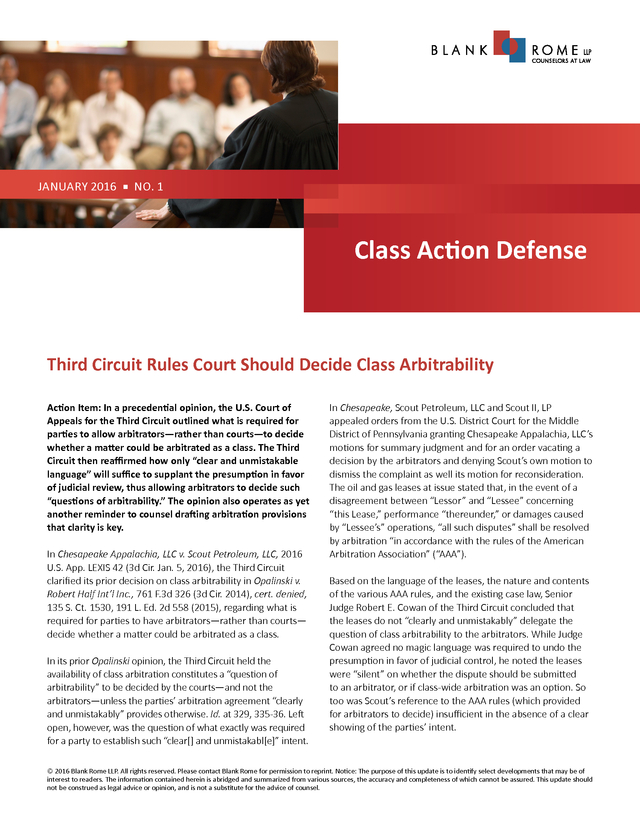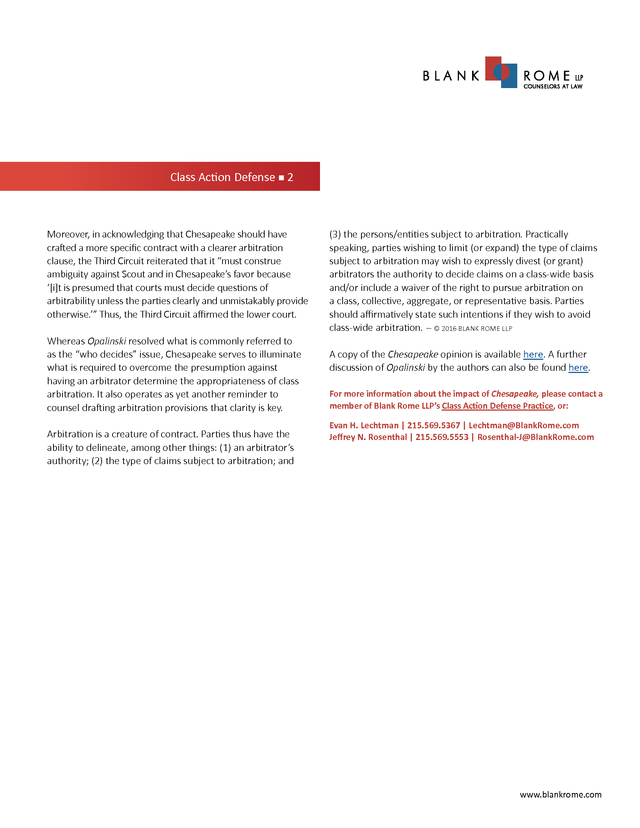Description
JANUARY 2016 n NO. 1
Class Action Defense
Third Circuit Rules Court Should Decide Class Arbitrability
Action Item: In a precedential opinion, the U.S. Court of
Appeals for the Third Circuit outlined what is required for
parties to allow arbitrators—rather than courts—to decide
whether a matter could be arbitrated as a class. The Third
Circuit then reaffirmed how only “clear and unmistakable
language” will suffice to supplant the presumption in favor
of judicial review, thus allowing arbitrators to decide such
“questions of arbitrability.” The opinion also operates as yet
another reminder to counsel drafting arbitration provisions
that clarity is key.
In Chesapeake Appalachia, LLC v.
Scout Petroleum, LLC, 2016 U.S. App. LEXIS 42 (3d Cir.
Jan. 5, 2016), the Third Circuit clarified its prior decision on class arbitrability in Opalinski v. Robert Half Int’l Inc., 761 F.3d 326 (3d Cir. 2014), cert.
denied, 135 S. Ct. 1530, 191 L.
Ed. 2d 558 (2015), regarding what is required for parties to have arbitrators—rather than courts— decide whether a matter could be arbitrated as a class. In its prior Opalinski opinion, the Third Circuit held the availability of class arbitration constitutes a “question of arbitrability” to be decided by the courts—and not the arbitrators—unless the parties’ arbitration agreement “clearly and unmistakably” provides otherwise. Id.
at 329, 335-36. Left open, however, was the question of what exactly was required for a party to establish such “clear[] and unmistakabl[e]” intent. In Chesapeake, Scout Petroleum, LLC and Scout II, LP appealed orders from the U.S. District Court for the Middle District of Pennsylvania granting Chesapeake Appalachia, LLC’s motions for summary judgment and for an order vacating a decision by the arbitrators and denying Scout’s own motion to dismiss the complaint as well its motion for reconsideration. The oil and gas leases at issue stated that, in the event of a disagreement between “Lessor” and “Lessee” concerning “this Lease,” performance “thereunder,” or damages caused by “Lessee’s” operations, “all such disputes” shall be resolved by arbitration “in accordance with the rules of the American Arbitration Association” (“AAA”). Based on the language of the leases, the nature and contents of the various AAA rules, and the existing case law, Senior Judge Robert E.
Cowan of the Third Circuit concluded that the leases do not “clearly and unmistakably” delegate the question of class arbitrability to the arbitrators. While Judge Cowan agreed no magic language was required to undo the presumption in favor of judicial control, he noted the leases were “silent” on whether the dispute should be submitted to an arbitrator, or if class-wide arbitration was an option. So too was Scout’s reference to the AAA rules (which provided for arbitrators to decide) insufficient in the absence of a clear showing of the parties’ intent. © 2016 Blank Rome LLP.
All rights reserved. Please contact Blank Rome for permission to reprint. Notice: The purpose of this update is to identify select developments that may be of interest to readers.
The information contained herein is abridged and summarized from various sources, the accuracy and completeness of which cannot be assured. This update should not be construed as legal advice or opinion, and is not a substitute for the advice of counsel. . Class Action Defense n 2 Moreover, in acknowledging that Chesapeake should have crafted a more specific contract with a clearer arbitration clause, the Third Circuit reiterated that it “must construe ambiguity against Scout and in Chesapeake’s favor because ‘[i]t is presumed that courts must decide questions of arbitrability unless the parties clearly and unmistakably provide otherwise.’” Thus, the Third Circuit affirmed the lower court. Whereas Opalinski resolved what is commonly referred to as the “who decides” issue, Chesapeake serves to illuminate what is required to overcome the presumption against having an arbitrator determine the appropriateness of class arbitration. It also operates as yet another reminder to counsel drafting arbitration provisions that clarity is key. Arbitration is a creature of contract. Parties thus have the ability to delineate, among other things: (1) an arbitrator’s authority; (2) the type of claims subject to arbitration; and (3) the persons/entities subject to arbitration. Practically speaking, parties wishing to limit (or expand) the type of claims subject to arbitration may wish to expressly divest (or grant) arbitrators the authority to decide claims on a class-wide basis and/or include a waiver of the right to pursue arbitration on a class, collective, aggregate, or representative basis.
Parties should affirmatively state such intentions if they wish to avoid class-wide arbitration. — © 2016 BLANK ROME LLP A copy of the Chesapeake opinion is available here. A further discussion of Opalinski by the authors can also be found here. For more information about the impact of Chesapeake, please contact a member of Blank Rome LLP’s Class Action Defense Practice, or: Evan H.
Lechtman | 215.569.5367 | Lechtman@BlankRome.com Jeffrey N. Rosenthal | 215.569.5553 | Rosenthal-J@BlankRome.com www.blankrome.com .
Scout Petroleum, LLC, 2016 U.S. App. LEXIS 42 (3d Cir.
Jan. 5, 2016), the Third Circuit clarified its prior decision on class arbitrability in Opalinski v. Robert Half Int’l Inc., 761 F.3d 326 (3d Cir. 2014), cert.
denied, 135 S. Ct. 1530, 191 L.
Ed. 2d 558 (2015), regarding what is required for parties to have arbitrators—rather than courts— decide whether a matter could be arbitrated as a class. In its prior Opalinski opinion, the Third Circuit held the availability of class arbitration constitutes a “question of arbitrability” to be decided by the courts—and not the arbitrators—unless the parties’ arbitration agreement “clearly and unmistakably” provides otherwise. Id.
at 329, 335-36. Left open, however, was the question of what exactly was required for a party to establish such “clear[] and unmistakabl[e]” intent. In Chesapeake, Scout Petroleum, LLC and Scout II, LP appealed orders from the U.S. District Court for the Middle District of Pennsylvania granting Chesapeake Appalachia, LLC’s motions for summary judgment and for an order vacating a decision by the arbitrators and denying Scout’s own motion to dismiss the complaint as well its motion for reconsideration. The oil and gas leases at issue stated that, in the event of a disagreement between “Lessor” and “Lessee” concerning “this Lease,” performance “thereunder,” or damages caused by “Lessee’s” operations, “all such disputes” shall be resolved by arbitration “in accordance with the rules of the American Arbitration Association” (“AAA”). Based on the language of the leases, the nature and contents of the various AAA rules, and the existing case law, Senior Judge Robert E.
Cowan of the Third Circuit concluded that the leases do not “clearly and unmistakably” delegate the question of class arbitrability to the arbitrators. While Judge Cowan agreed no magic language was required to undo the presumption in favor of judicial control, he noted the leases were “silent” on whether the dispute should be submitted to an arbitrator, or if class-wide arbitration was an option. So too was Scout’s reference to the AAA rules (which provided for arbitrators to decide) insufficient in the absence of a clear showing of the parties’ intent. © 2016 Blank Rome LLP.
All rights reserved. Please contact Blank Rome for permission to reprint. Notice: The purpose of this update is to identify select developments that may be of interest to readers.
The information contained herein is abridged and summarized from various sources, the accuracy and completeness of which cannot be assured. This update should not be construed as legal advice or opinion, and is not a substitute for the advice of counsel. . Class Action Defense n 2 Moreover, in acknowledging that Chesapeake should have crafted a more specific contract with a clearer arbitration clause, the Third Circuit reiterated that it “must construe ambiguity against Scout and in Chesapeake’s favor because ‘[i]t is presumed that courts must decide questions of arbitrability unless the parties clearly and unmistakably provide otherwise.’” Thus, the Third Circuit affirmed the lower court. Whereas Opalinski resolved what is commonly referred to as the “who decides” issue, Chesapeake serves to illuminate what is required to overcome the presumption against having an arbitrator determine the appropriateness of class arbitration. It also operates as yet another reminder to counsel drafting arbitration provisions that clarity is key. Arbitration is a creature of contract. Parties thus have the ability to delineate, among other things: (1) an arbitrator’s authority; (2) the type of claims subject to arbitration; and (3) the persons/entities subject to arbitration. Practically speaking, parties wishing to limit (or expand) the type of claims subject to arbitration may wish to expressly divest (or grant) arbitrators the authority to decide claims on a class-wide basis and/or include a waiver of the right to pursue arbitration on a class, collective, aggregate, or representative basis.
Parties should affirmatively state such intentions if they wish to avoid class-wide arbitration. — © 2016 BLANK ROME LLP A copy of the Chesapeake opinion is available here. A further discussion of Opalinski by the authors can also be found here. For more information about the impact of Chesapeake, please contact a member of Blank Rome LLP’s Class Action Defense Practice, or: Evan H.
Lechtman | 215.569.5367 | Lechtman@BlankRome.com Jeffrey N. Rosenthal | 215.569.5553 | Rosenthal-J@BlankRome.com www.blankrome.com .













